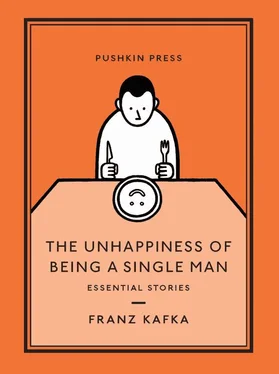WHEN THE SIXTEEN-YEAR-OLD Karl Rossmann, whose unfortunate parents had sent him to America because a servant girl had seduced him and had his child, sailed into the harbour at New York, he saw the Statue of Liberty, who’d already been visible for a while, suddenly bathed in a new light, as if the sunshine had grown stronger. The sword in her hand seemed only just to have been raised aloft, and the unchained breeze blew freely around her figure.
‘It’s so high!’ he said to himself and, even though he’d momentarily forgotten all about disembarking, the swelling crowds of porters gradually pushed him up against the ship’s railing.
A young man he’d got to know slightly on the crossing said as he went past, “Hey, don’t you want to get off?”
“I’m ready,” said Karl, laughing at him, and because he was a strong boy and feeling exuberant, he lifted his suitcase up to his shoulder. But as he looked past his acquaintance, who was swinging his stick and already starting to move off with the others, he realized with dismay that he’d forgotten his umbrella below decks. He quickly asked the acquaintance, who didn’t look too happy about it, to do him a favour and watch his suitcase for a few minutes, then glanced around so that he’d be able to find this spot again, and hurried off. Unfortunately, when he got below he discovered that the most direct passageway had now been closed, probably something to do with the passengers disembarking, and he had to go searching down staircases that just led to more stairs, through constantly branching corridors, through an empty room with an abandoned writing desk, until, eventually, having only ever gone this way once or twice before, and then always as part of a big group, he was completely and utterly lost. Bewildered, meeting no one and hearing only the scrabbling of thousands of human feet above him, along with, far off, as if carried on a breeze, the last workings of the stopped engines, he began to bang on a little door that he’d come across as he wandered around.
“It’s open!” someone shouted from inside, and Karl opened the door with a sincere sigh of relief. “Why are you banging on the door like a maniac?” asked an enormous man, barely glancing at Karl. From some overhead shaft, a murky light that had lost its lustre higher up the ship fell into the wretched cabin, in which a bed, a cupboard, a chair and the man stood pressed against each other as if in storage. “I’ve lost my bearings,” said Karl. “I didn’t really notice on the crossing, but it’s such a big ship.”
“You’re right there,” the man said with some pride, and carried on tinkering with the lock on a small suitcase, which he kept shutting with both hands so he could listen to it clicking into place. “But come on in,” said the man, “Surely you’re not just going to stand out there!”
“I’m not disturbing you?” asked Karl.
“Come off it, how would you be disturbing me?”
“Are you German?” Karl tried to reassure himself, having heard a lot about the dangers that awaited new arrivals in America, especially from Irishmen.
“I am, I am,” said the man. Karl still hesitated. The man abruptly grabbed the door handle and, closing it rapidly, pulled Karl into the room with him. “I hate it when people look in at me from the corridor,” said the man, who’d gone back to working on his suitcase. “Everybody just walks past and looks inside, I can’t put up with that.”
“But the corridor’s completely empty,” said Karl, who was squashed uncomfortably against the bedpost.
“It is now,” said the man.
‘But now is what we’re talking about,’ thought Karl, ‘This man’s hard to have a conversation with.’
“Lie on the bed, you’ll have more space,” said the man. Karl squirmed over as well as he could and laughed out loud at his first failed attempt to swing himself into it. But hardly was he in the bed than he cried, “Oh God, I’ve totally forgotten my suitcase!”
“Where is it?”
“Up on the deck, someone I met is keeping an eye on it. Oh, what’s his name again?” And he pulled a calling card out of the secret pocket his mother had sewn into the lining of his coat for the journey. “Butterbaum. Franz Butterbaum.”
“Do you really need the things in your suitcase?”
“Of course.”
“Then why did you give it to a stranger?”
“I forgot my umbrella below decks and came down to fetch it, but didn’t want to lug the suitcase around with me. And then I got lost.”
“You’re by yourself? Not with anyone?”
“Yes, by myself.” ‘Maybe I should stick with this man,’ went through Karl’s head, ‘Where could I quickly find a better friend?’
“And now you’ve lost the suitcase too. To say nothing of the umbrella.” The man sat down on the chair as if Karl’s affairs had become more interesting.
“I’m sure the suitcase is still there.”
“Be as sure as you like,” said the man, and had a good scratch at his short, dark, thick hair, “but on a ship the way people behave changes with each port. In Hamburg maybe your Butterbaum really would have watched your suitcase, here it’s most likely they’ve both already vanished.”
“But then I’ve got to go up and look for it,” said Karl, glancing around for how to clamber back out.
“Just stay,” said the man, and thrust his hand against Karl’s chest, almost roughly, pushing him back onto the bed.
“But why?” asked Karl angrily.
“Because there’s no point,” said the man. “In a little while I’ll be going too, then we can go together. Either the suitcase has been stolen, in which case it can’t be helped, or your Butterbaum left it standing there, in which case it’ll be all the easier to find once the ship’s empty. The same goes for your umbrella.”
“Do you know your way around the ship?” asked Karl distrustfully, and it seemed to him that this generally convincing idea, that it would be easiest to find his things when the ship was empty, had a hidden catch.
“I’m one of the ship’s stokers,” said the man.
“You’re a stoker!” cried Karl happily, as though that surpassed all his expectations, and, propping himself up on his elbows, he took a closer look at the man. He said, “Just next to the cabin where I was sleeping, near the Slovak, there was a hatch where you could see into the engine room.”
“Yes, that’s where I was working,” said the stoker.
“I’ve always been interested in machinery,” said Karl, following his own train of thought, “and I would definitely have become an engineer if I hadn’t had to go to America.”
“Why did you have to go?”
“Never mind,” said Karl, and waved the whole story away. While doing so he smiled at the stoker, as if asking him to be lenient about this thing Karl hadn’t admitted.
“There will have been a reason,” said the stoker, and it wasn’t clear whether he wanted to hear the story or deflect it.
“Now I suppose I could be a stoker too,” said Karl, “My parents don’t care at all any more about what I end up doing.”
“My job’s coming up,” said the stoker, then coolly put his hands in his pockets and slung his legs, clad in wrinkled, leathery, iron-grey trousers, onto the bed to stretch them out. Karl had to shift closer against the wall.
“You’re leaving the ship?”
“Absolutely, we’re going ashore today.”
“Why? Don’t you like it?”
“Well, it’s a question of circumstances, it’s not always about whether you like it or not. But as it happens, you’re right, I don’t like it. You’re probably not seriously thinking about becoming a stoker, but that’s exactly the state of mind in which you’re most likely to become one. I strongly advise you against it. If you wanted to study when you were in Europe, why don’t you want to study here? The American universities are so much better than the European ones.”
Читать дальше












